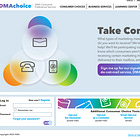The Critical Privacy Threat Most People Ignore (And It Could Cost You Your Safety): Your Address
If someone can find out where you live, the harm they can cause can escalate from digital harm to physical harm. Take these 8 steps to protect your address and make it harder to find.
Many people think that the most sensitive and vital personal information to protect is your Social Security Number. I would argue that the most critical piece of information you want to keep private is your physical address, or where you live. If a bad actor has your SSN and other personal information, they may steal your identity, but if a bad actor knows where you live, they (or others) can show up and cause physical harm to you, your family, and your property.
Making it difficult for someone to find out your physical address, where you live, is a critical aspect of privacy. We want to reduce the likelihood that someone can then bridge the gap from digital harm to physical harm.
One of the most critical things you can do is invest time and money into protecting your physical address.
You don’t need to be a public figure for this to be a risk. Almost anyone is at risk for reasons that may be entirely outside of their control. For example, the jurors in the Trump Hush Money trial that found him guilty were doxxed1 by MAGA supporters (source). These were ordinary people doing their civic duty. Swatting2 attacks against gamers are not uncommon (source). Doxxing and swatting are intimidation tactics that have been used against victims based on who they are, what they say, or what they believe in (judge example, synagogue example, politician example, celebrity example. Stalkers finding the address of their victim is another risk.
Like most things with privacy, if you wait until you need it, it’s too late. The best way to protect your privacy (and your address) is to take preventive measures before you need them.
Keep reading to learn about the concrete, actionable steps you can take now to protect your address and reduce your risk.
#1: Get and use a secondary mailing address - break the link between where you live and credit reporting agency databases
The key concept here is that credit agencies and data brokers retrieve data linked to the mailing address or billing address used by your financial institutions, not your physical address.
I have discovered that using a different mailing address than your physical address can start breaking the link between where you live and the information that credit agencies and financial institutions share with third parties. This means that data brokers and credit bureaus will link your name to your mailing address, rather than your actual residence.
Here’s how to get a new mailing address:
Get a USPS PO BOX or a commercial PO BOX using a service like earthclassmail.com (which is on Tate’s Tools List).
Note: Virtual mail service companies like EarthClassMail.com offer services such as receiving and forwarding, opening and scanning, and more. If you use a service like this, it’s critical that you trust the company and secure your account with a strong, unique password and multi-factor authentication.
Use this address whenever you are asked to give an address by a 3rd party (e.g., doctor’s office). Very few organizations need your physical address; they typically only require a mailing address, so provide one that isn’t your home address.
Update the mailing address on all your banks, credit cards, and other financial institutions to this new address. This ensures that your secondary mailing address becomes your billing address when using your credit card. This breaks the link between what’s on your credit report and where you live. Credit agencies and financial institutions constantly buy and sell your information for marketing purposes, so having them use a secondary address that isn’t where you live is excellent protection.
Check out my post on opting out of each bank you use.
Auto-forward all your mail from your physical address to this new mailing address at USPS.
A best practice is not to receive any mail at your physical address — that way, if someone intercepts it or is physically searching your mailbox, they can’t get any information about you (or who lives there).
Make sure to shred any documents with your name and address on them before recycling or throwing them out.
A note on shipping address: I've found that even if you use your physical address for receiving packages, it doesn’t seem to get pulled into databases as easily. However, depending on your risk profile, you could have items shipped and held at a local UPS, FedEx, or USPS location, and then go to pick them up in person, or have a separate service receive the packages and reship them to you.
#2: Don’t give out your physical address
The fewer people or organizations that have your physical address, the lower the chances are that it will be added to marketing lists, compromised in a breach, or otherwise abused by the organization that has it.
If possible, decline to provide your address.
If you need to provide an address, use your secondary address, not your physical address.
#3: Don’t post pictures of the outside of your house
One of the proven uses of AI is that it can geolocate almost any photo based on the surroundings in the background. There are now services available that do this type of geolocation easily. This means that if someone is targeting you (i.e., on your social media) and can find a photo of your house, they can quickly determine its location. Check out this article or this one for more terrifying details.
Don’t post pictures that show details of the outside of your house or yard. Even the landscape in the background can be used to identify your location uniquely.
Make sure to turn off location-tagging services on your phone so that you don’t inadvertently take a photo (with the GPS coordinates of your phone when it was taken) and share it. This is super easy; deny location permissions to your phone’s camera. Instructions here.
#4: Consider applying for protected or confidential status in your State or jurisdiction
Unfortunately, the information our governments (Cities and States) collect is often available to 3rd parties and sometimes even sold for income (in the case of voter registration, for example). Some jurisdictions may allow you to apply for protected status to help protect your information from third parties.
Here’s the most comprehensive list of voter confidentiality I could find that shows what options you have per State and what you might be able to qualify for — although this isn’t 100% accurate (i.e., in NY, it lists only Address Confidentiality Programs (ACP) recipients, but I was able to find reproductive health service providers also qualify).
If you’re interested in protecting your voter and DMV information from third parties, I recommend doing a quick search to find out what’s available in your city, county, and State. If you qualify, take this step!
Voter registration and the DMV
Unfortunately, the address tied to your state government ID or license may be linked to your voter registration. Depending on your jurisdiction, you may be required to provide your physical address instead of a mailing address. Your voter registration information is sold to third parties routinely. This chart shows how freely your voter registration information is available by State.
Some jurisdictions allow you to use a mailing address or keep your address confidential. For example, in Virginia, you can provide a mailing address in addition to your physical address, and this mailing address is what shows up on your license.
Some Address Confidentiality Programs allow for address protection for certain qualified people (usually victims of crimes), depending on the State. You can learn more about what your State provides here.
For example, certain public safety officials in Texas can make a request for confidentiality. In New York, reproductive health care service providers can also participate, in addition to victims.
I recommend searching “Address Confidentiality + State” and “Address Confidentiality + State + DMV” to see what is available to you.
You can also search for “Confidential voter + State”. New York has a form for this here. Some jurisdictions (here’s an example in Norfolk, VA) allow for protected voter registration if you meet certain broad criteria.
#5: Clean up property ownership and tax records
Many jurisdictions digitize and make public records of property ownership and taxes. For example, New York City has an online mapping tool where you can look up this information by address.
Again, depending on your jurisdiction, you may be able to opt out of having your records digitized and made available online. Search for this with your State, city, or county.
Another way to reduce your signature with property ownership is to buy property using a legal entity that isn’t you, such as a trust or LLC. Depending on your jurisdiction, this may protect your personal information from appearing in public records. I recommend consulting an attorney if you decide to pursue this.
#6: Opt out from marketing mailers with DMAChoice.org
This action puts your address on a do-not-mail list, preventing it from receiving marketing mailers. This makes your address less valuable, which reduces the likelihood that companies will buy and sell it, and in turn, it appears in fewer databases.
Go to https://www.dmachoice.org and sign up. Check out my post for additional details on how to do this.
#7: Blur your house on Google Maps and Apple Maps
Street View is an excellent way for a bad actor to conduct surveillance on your address—they can see what your house looks like, the types of windows and doors you have, any security systems you may or may not have, the cars you drive, etc. Street View provides an invaluable surveillance tool. Deny potential attackers from using it on where you live.
Opt out using the instructions in the posts below.
#8: Remove your information from data brokers
Manually request data broker companies to remove your information, or pay a service to do this for you. More details in my post below.
Stay Safe!
Tate
Doxxing is the act of publishing personal information such as name, email, phone number, address, relatives, etc., about someone online to direct harassment towards them.
Swatting is the act of calling the police and indicating a violent emergency at the address of the victim. This results in a “SWAT” team descending on the victim’s house, which is at a minimum disruptive, and can be very dangerous.










